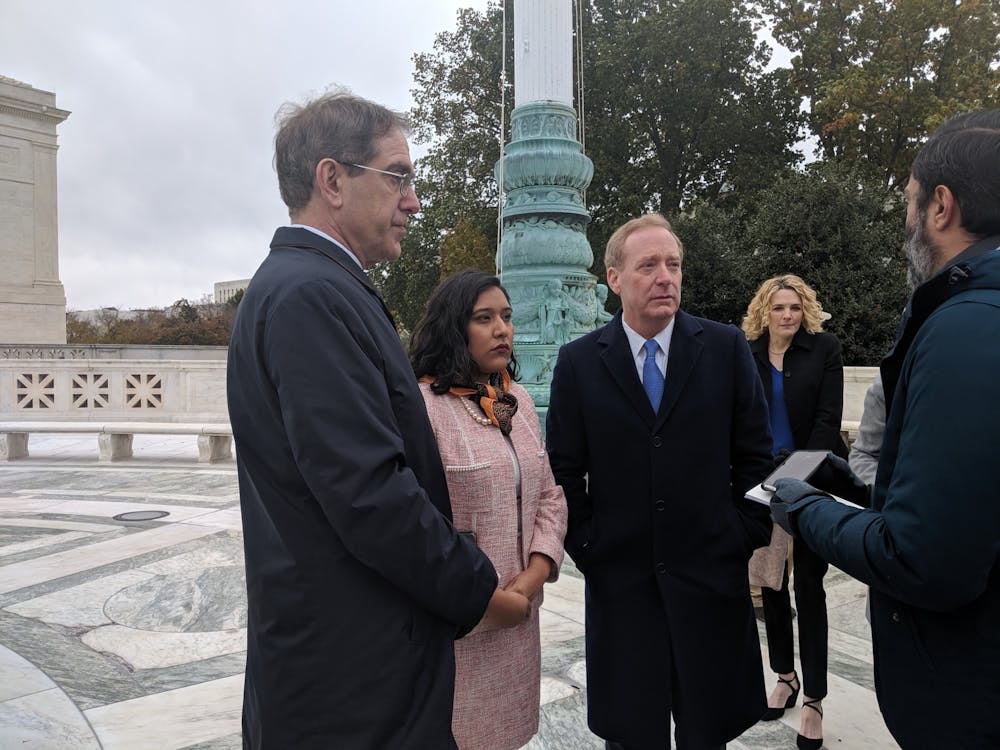After almost two decades of changing policy and political back and forth, America's DREAMers now await a Supreme Court decision with the power to cement their futures.
This upcoming decision was sparked in part by a case filed jointly in November of 2017 by the University, Microsoft, and Maria Perales Sanchez ‘18. Initially heard in the United States District Court for the District of Columbia, the federal lawsuit argues that the decision to rescind DACA was out of step with the Administrative Procedures Act (APA) and violated DACA recipients' due process rights under the Fifth Amendment.
The University's lawsuit has prompted a flood of corporate and educational institutions to mount similar challenges. This wave of private sector forays into legal activism, given the historical role of organizations like the American Civil Liberties Union (ACLU) and the National Association for the Advancement Of Colored People (NAACP), represents a new force in the American legal landscape.
The University's impetus to file this suit was explained by University President Christopher Eisgruber ’83 in a statement to The Daily Princetonian.
"We filed this suit because we thought that, together with Microsoft and our courageous alumna Maria Perales Sanchez ’18, we could provide a distinctive perspective that might influence the ultimate outcome of the litigation about DACA,” Eisgruber wrote.
Despite a lack of political traction over the years, exemplified in former President Barack Obama's inability to pass the DREAM (Development, Relief, and Education for Alien Minors) Act and his subsequent resort to executive orders, research has found that public support of protections for undocumented childhood arrivals is substantial across the nation. In 2018, Pew Research found that 73 percent of Americans favor legal status for childhood arrivals, including a majority of GOP voters.
In providing justification for their decision, the Trump Administration has primarily sold the move as an act to limit overreach by future executives.
"If the Supreme Court upholds DACA, it gives the President extraordinary powers, far greater than ever thought," President Donald Trump tweeted on Oct. 9.
A broad consensus indicates that this case, regardless of the outcome, will have a massive impact on the futures of America's almost 700,000 recipients of the 2012 DACA protections and estimated million more who never joined the program in the first place.
The three primary outcomes, according to Vox reporter Ian Millhiser, would create vastly different immigration policy ecosystems and may have long-standing implications on future presidents’ use of the executive order.
In the first scenario, the Court would render a decision much in line with the previous two rulings by the District Courts — essentially rejecting the Administration's justifications for ending the program, claiming a lack of sound policy justification. As a result, the program would by default reopen to those eligible, but in this scenario the Administration is able to reinstate its policy after providing some policy justification. This outcome would thus only represent a technical and temporary win for DACA activists.
The second scenario is likewise a technical and narrow ruling, but one which would keep the current policy directive in place. Either by affirming the Administration's legal and policy justifications or by finding the question outside of the purview of the Court, this verdict would allow the Administration to rescind DACA.

The final scenario is an addition to the second. The court could also deliberate on the fundamental legality of DACA. Here, as the court finds the issue within its purview, it could affirm the legal arguments of the Administration and determine DACA to be legally void. Given this, future executive action on this issue would be deemed dead on arrival.
Eisgruber, when asked his prediction of the outcome based on the oral arguments he attended early this November, presented a reserved yet optimistic opinion.
"My year as a Supreme Court law clerk taught me that oral argument is often an unreliable indicator of the Court’s eventual judgment. I am optimistic because I believe that our legal argument, which twice prevailed in the district court, is sound," he wrote.
Missing from the list of Millhiser’s possible outcomes is a sweeping judicial endorsement of the DACA program. That power lies with a different governmental branch altogether.
"The DREAMers need a path to citizenship, and only Congress can provide that. We will accordingly continue to urge Congress to enact a permanent legislative solution, regardless of what the Court decides in this case," Eisgruber wrote.
The National Immigration Law Center, based on its experience with the Supreme Court, expects a decision by June 2020 at the latest.








